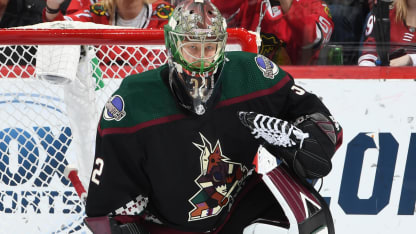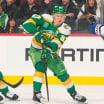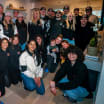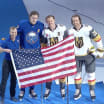Vancouver Canucks goalie prospect Michael DiPietro has a message written on the inside of his blocker, but it changes. When DiPietro played for Canada at the 2019 World Junior Championship, he used the anagram "ABC," which stood for, "[Be] Aware, Breathe, Choose," as a way to prevent his focus from drifting in a high-pressure environment, something he got from Vancouver's mental performance consultant, Ryan Hamilton.
DiPietro started this season with "Take it 1 puck at a time" written on his blocker. It is advice he picked up from Tampa Bay Lightning veteran Curtis McElhinney when they roomed together at the 2018 World Hockey Championship. By the time he was called up to the Canucks from Utica of the American Hockey League three months ago, DiPietro had a new blocker and a new message: "WIN," or "What's Important Now."
"Sometimes I just come up with them on my own, but we have a really good mental strength coach in Utica, and he and I talk almost every other day," DiPietro said. "Goaltending, you are kind of on an island out there and you have a tendency to get down on yourself pretty quick after a goal, so he preached it to the whole team, this anagram, WIN. I think it can tie into the next play in the sense of 'what's important now,' but it also stands for the word win, so when it comes down to tough points in the game, maybe you let in four goals but you can still win 5-4, to me the only thing that matters is winning. So it's a good thing to refer back to."
Even at the highest level, the pep talks or written messages goalies direct at themselves can be about not letting doubt creep in.
"I've been probably saying the same things for seven, eight, nine years," Raanta said. "It's pretty simple, a couple things like, 'You can do it, you've been there before, you're here for a reason,' and things like that. It's just something that calms you down and brings you back to a calm place. It's more about just reminding yourself that, 'Hey, everything is OK, don't worry about it, you have made millions of saves, so just forget it and let it go.'"


















